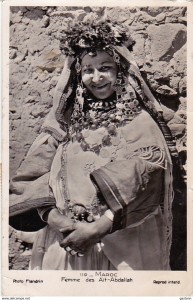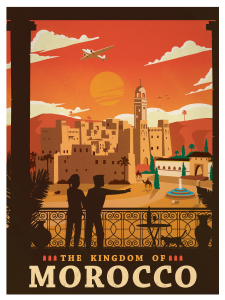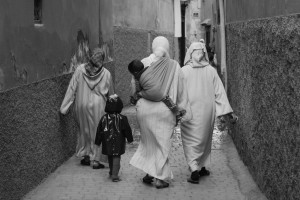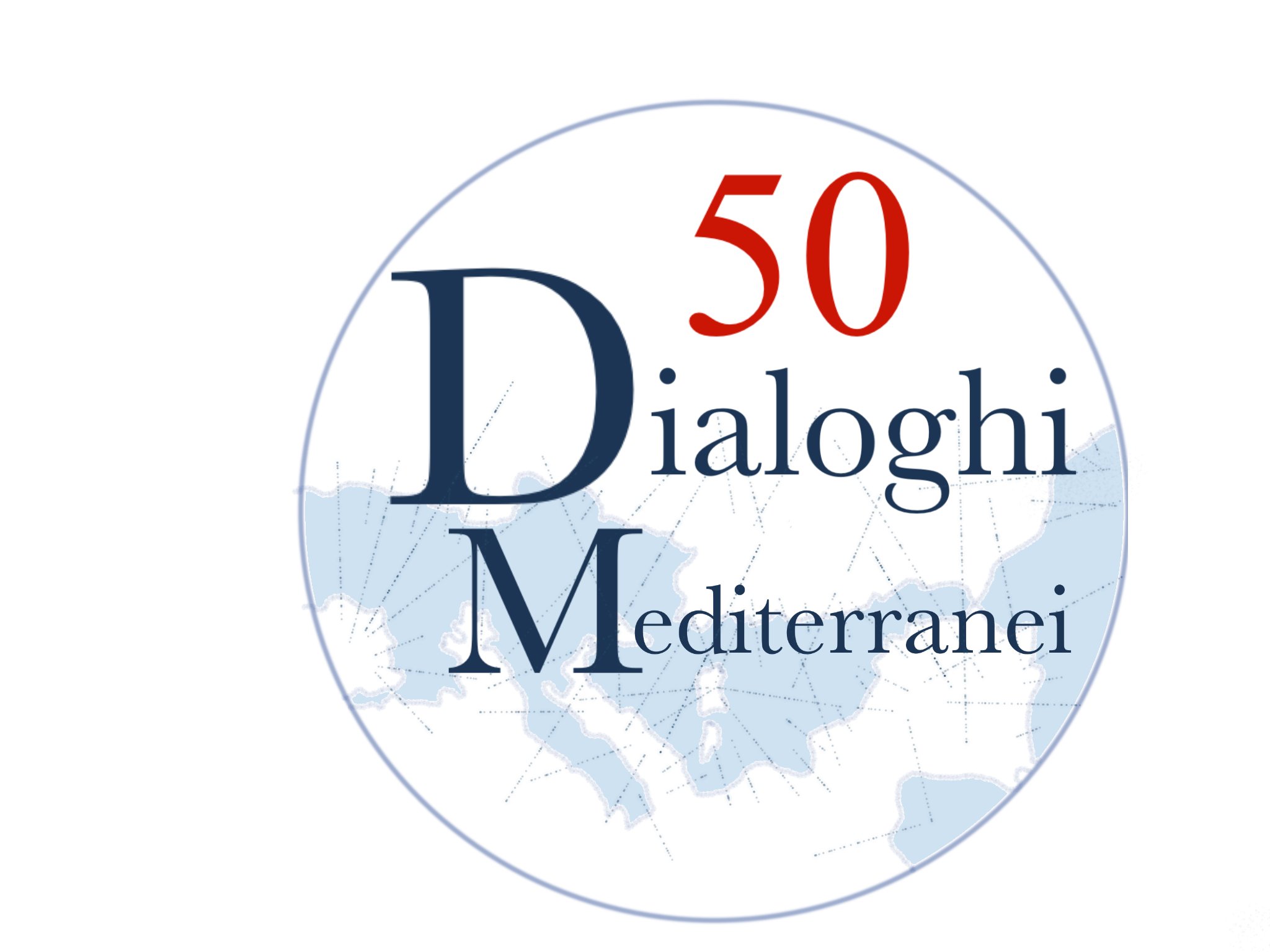Ho raccolto questa storia durante dieci mesi di permanenza a Marrakech, frequentando ogni settimana le storytelling sessions del Cafè Clock tra settembre 2015 e luglio 2016.
Dopo aver individuato le storie che a mio parere erano più significative, mi sono dedicata alla registrazione delle stesse, durante gli incontri della domenica o in sedute private, in modo da ottenere una registrazione quanto più chiara possibile. Alcuni dei racconti sono stati, successivamente, trascritti in dārija e sottoposti al processo di traduzione in inglese, altri hanno semplicemente subìto il processo di traduzione. Fondamentale nelle operazioni di trascrizione e traduzione è stato l’aiuto di Mohammed Amine Iziki, al tempo apprendista contastorie del Cafe Clock.
L’analisi dei racconti si basa sulle registrazioni delle storie raccontate dai vari contastorie con i quali ho condotto il mio lavoro di ricerca, il tutto è quindi frutto di una narrazione “viva”, esemplificativa del tema dell’oralità. Cercherò di tenere in considerazione, all’interno dell’analisi, tutti quei vari elementi che caratterizzano un racconto orale, come le pause, i cambiamenti del tono della voce e le piccole aggiunte, sotto forma di commenti, che il narratore ha utilizzato in quel preciso momento.
 Good Intentions and Bad Intentions
Good Intentions and Bad Intentions
In the name of God, in the name of God and prayers and peace may be upon His Prophet.
It is a good omen and blessing and might, and to God we owe much gratefulness.
May glory be to God, Him with the great possession and no equals, and twice I pray upon the honourable Hachami.
May you prosper, you who prayed upon the Prophet of God.
It has been told, and God is better and wiser at knowing the unknown, that there were, in an ancient time, in a previous era, two people who were friends.
In this friendship, one of them was good and had only pure intentions and he wanted good for everyone, while the other one was the opposite; he hated and envied him.
They were both merchants, so they used to buy and re-sell merchandise.
The one who had pure intentions never kept anything hidden from his friend, while his friend hated him and was always planning tricks to make him lose his money.
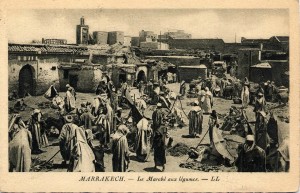 When he would see him selling something, he would call the person who was going to buy it and tell him: «Come here, how much is he going to sell you that for?» The other person would tell him the price, so he would say: «No, I have the same merchandise and I would sell it to you for less», just so the first one would not make any money. He always ruined his deals, and he always dug holes for him that he couldn’t climb out of.
When he would see him selling something, he would call the person who was going to buy it and tell him: «Come here, how much is he going to sell you that for?» The other person would tell him the price, so he would say: «No, I have the same merchandise and I would sell it to you for less», just so the first one would not make any money. He always ruined his deals, and he always dug holes for him that he couldn’t climb out of.
The other one was the opposite. When some interesting goods arrived from outside the city, he used to call his friend to let him know, saying: «Come with me, there is good merchandise that you can sell and benefit from». He used to refer clients to him and look out for his interests.
The first one always sought good for his friend while the other one did everything he could to ruin him.
One day, the good man realized what was happening, and he told himself: «this friend of mine, as much as I do good for him, he repays me with bad deeds, so my business is falling apart and I’m losing all my money. I cannot do anything inappropriate to him, I can’t touch his money nor his health. I’m going to leave this land! I’m going to leave it!».
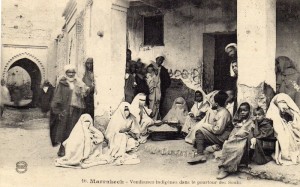 So, he took his merchandise and whatever he had left, even though it wasn’t much, and left the city. He moved from one land to the other until he spent everything he had. He started walking and thinking about what was happening to him and was telling himself: «Oh God, I want good for people, and whenever I do any business with someone, I do it with good intentions, until people started calling me ‘good intentions’. My friend hated me, he wanted to ruin me, he wanted to make me lose my money, and now I’m poor»
So, he took his merchandise and whatever he had left, even though it wasn’t much, and left the city. He moved from one land to the other until he spent everything he had. He started walking and thinking about what was happening to him and was telling himself: «Oh God, I want good for people, and whenever I do any business with someone, I do it with good intentions, until people started calling me ‘good intentions’. My friend hated me, he wanted to ruin me, he wanted to make me lose my money, and now I’m poor»
While he was walking and talking to himself and complaining to God, he drew closer to a city and saw a piece of land.
This piece of land was circular like a nest, so he went inside. There he saw a spring with water flowing out of it.
He used it for his ablutions, then he prayed and sat there for a while, praying and worshipping God and mentioning His might and thinking of something to do.
Suddenly his brain told him: «do you know what you should do? Renounce earthly life and sit here for the time you have left and devote it to God».
He stayed there until he grew long hair and a beard. A lot of time passed without him moving from that place.
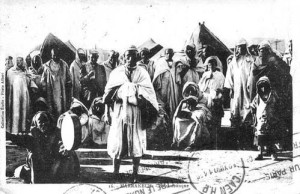 From there, caravans of merchants used to pass transporting their goods, and when they got to the spot where he was, they usually took some water from that spring.
From there, caravans of merchants used to pass transporting their goods, and when they got to the spot where he was, they usually took some water from that spring.
And God Almighty cured whoever drank from that spring from any disease he had, so people started helping the man giving him food, some of them gave him clothes, and other things like that.
So, he got famous because of that, since God cured whoever drank from that water, and even for those who visited that man, whenever they asked him to pray to God in order to fulfil one of their wishes, it always came true.
As he was famous, people started coming from far away offering him money, gold, clothes, etc.
He stayed there next to that water spring until a pomegranate tree grew nearby. That tree bore fruit that he used to eat and give anyone who came by. When someone would eat a pomegranate that the man had given him, it would taste sweeter than honey. His heart would feel relieved, and he would forget about all his concerns.
So many people started coming from all over.
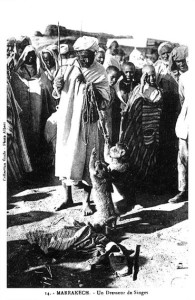 The nearby city was ruled by a king who had one daughter, and she was all he cherished and cared about in his life. The girl fell ill, and no doctor could find a cure or even knew what she had.
The nearby city was ruled by a king who had one daughter, and she was all he cherished and cared about in his life. The girl fell ill, and no doctor could find a cure or even knew what she had.
They came, one after the other, but none of them cured her for a whole year. They gave her their medicines, but nothing happened, and she was just getting sicker and sicker.
One day a minister told the king: «I have news for you, your highness».
The king said: «I hope good news. What is it?»
He said, «There is a man in your own city that merchant caravans visit, and their wishes are fulfilled. He has a spring with water that cures whoever drinks it».
So, the king said, «If we want to get this man, we will have to get the spring, too. That’s why I’m going to go to him myself this time».
He took his daughter, followed by ministers and soldiers, and headed to him.
When the man saw the king and his ministers, he was afraid and thought that they had come to chase him from his place or take him to jail. Then, the king got off his horse and walked until he was close enough to tell him, «Just stay where you are».
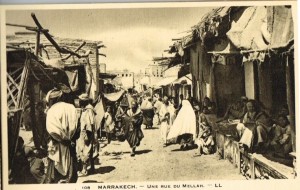 He kept on sitting until the king arrived and greeted him: “How are you?”, he asked: «Is everything okay?». Then he added, «Are you living in here?».
He kept on sitting until the king arrived and greeted him: “How are you?”, he asked: «Is everything okay?». Then he added, «Are you living in here?».
«Yes» he said
«Are you well?»
«Yes»
And then the king announced: «I have a sick daughter, and this is what has happened to her» and he told him the story of his daughter.
Then the man said, «The one who cures is God». He stood up and brought the princess to sit in front of him and gave her some water to drink.
The moment she drank it, she let out a heavy breath showing that her heart was relieved.
Her father turned to her and asked, «So?»
She told him «Father, I can feel my body healing from the inside and being cured. I feel such relief that my brain is getting active again».
The king was happy to see his daughter better again. The good man took a pomegranate, split it, and gave half to the king and half to his daughter. She finished her half and so did the king. Immediately he started to feel as if something as cold as ice was going down his body, and he was suddenly feeling better, and even though he wasn’t sick, he felt relieved and more active.
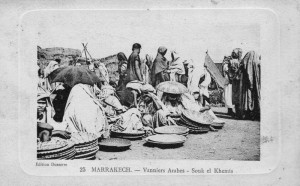 The man said, «Take your daughter, she is cured now».
The man said, «Take your daughter, she is cured now».
The king answered, «If she is, I will reward you»,, so he rewarded him, giving him clothes, money, and many other goods. Then he took his daughter and left.
When the girl arrived at the palace, she started walking and running and eating and drinking and playing, and her life went back to normal.
The king was satisfied.
She asked him: «Father?»
«Yes?»
«That person should not stay there. You should help him. He is abandoned in the middle of nowhere».
He said, «Alright»., so he sent the man his guards and soldiers who brought him with pride on the back of a horse, happy all the way.
They brought him inside the palace, cleaned him, shaved him, and the features of his face became more visible.
He stayed there with them until the princess spoke to her father again. «Father?»
«Yes?»
«It would please me if this man became my husband. This is the man I want. He has humanity, and chivalry, and he fears God. He has everything».
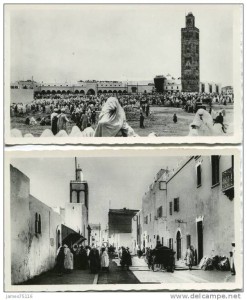 He told her, «My daughter, if you want him, I can’t take him away from you. My life is yours, and I’ll do whatever you want».
He told her, «My daughter, if you want him, I can’t take him away from you. My life is yours, and I’ll do whatever you want».
He called him and sat with him. The man ate and drank embarrassed in front of the king, keeping his head down.
The king said: «Look, don’t be shy. I brought you close to me, and I want to make you even closer and give you a higher status with my own hand. Would you marry my daughter?».
The man was saying to himself, «How could I get to this point? The king would marry me to his daughter!» Then he answered: «Your highness, I am honoured that the king himself is joking with me, God bless your highness».
But the king said, «No, I am speaking in earnest».
.So, he said, «Sir, if you’re serious, consider me your servant. I’ll do whatever you want, and you choose as you please».
The king married her to him, and people were happy. They ate and drank and the whole city was celebrating the wedding. When it was time for them to be together, he found her as he wanted her to be and was happy with her, and so was she. He broke the seal and took her.
From time to time he used to sit with the king in court, sometimes he used to go out to hunt, other times he was with the ministers or just walking around. People knew him as the king’s son-in-law. Everyone appreciated and respected him, including the ministers.
It went on like that, and the princess got pregnant and was about to give birth when the king passed away.
While he was on his deathbed, he gathered his ministers and told them: «Listen to my advice, and whoever ignores it should fear for himself».
They responded, «We’re all under your command».
He said, «If I die, he is going to be my successor and rule you», and they accepted.
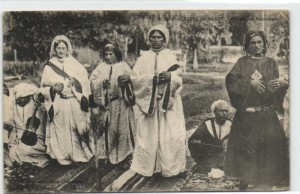 When the king died, they buried him under the ground. His funeral passed along with the mourning days. They brought the son-in-law and made him sit on the throne, people pledged their allegiance to him, and he became their king.
When the king died, they buried him under the ground. His funeral passed along with the mourning days. They brought the son-in-law and made him sit on the throne, people pledged their allegiance to him, and he became their king.
As king he ruled with justice. He gave clothes to those who didn’t have them, he was generous with orphans, and took the rights of those who couldn’t take them with their own hands. He became famous for ruling fairly and being generous until all his subjects loved him. The poets even started to write poems about him and write songs to compliment him.
That city used to have a feast every year. It was when he would invite every poor person in the city to come to the palace and he would give them, with his own hands, clothes, money, and everything they needed, both men and women, also widows and their children. He distributed that wealth for three days, and all the citizens could benefit from it.
One year, people gathered around as usual, approaching him one by one. He looked and saw someone coming in front of him with his head down and, after taking a good look at him, he discovered that it was his friend “bad intentions” looking dirty, with messy hair and all covered in dust, including his face.
The man came to him and said: «God bless your highness».
The king replied, «Where are you from?»
He said, «I’m an outsider and time didn’t treat me well. I used to be a merchant and have a lot of money and plenty of wealth, but it’s all gone. My boats sank in the sea with my merchandise, and I lost everything I had and became poor. I started travelling from one city to another, from one harbour to another, and from one port to another, until I got here. I have been in this city for three months, and people here are good to me and they help me. When this day arrived, I saw everyone dressing up and coming to the palace, so I asked them: ‘What’s happening?’ They said, ‘This day is a feast for us, and the king gives away food and clothes and money’, so I came with these people in order to get something just like them».
The king said, «Good, good, that’s alright», and he clapped his hand.
A minister appeared, «God bless your highness».
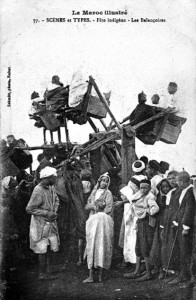 He said, «You will take this one, shave him, clean him, and bring him to me looking good and clean».
He said, «You will take this one, shave him, clean him, and bring him to me looking good and clean».
«Yes, sire».
They took him to the hammam, washed his body, shaved his hair, and changed his clothes. He put on new clothes, and they made him sit in front of the king.
«God bless your highness».
He said, «Sit» and so he did. He asked him, «How do you feel now?»
He answered, «May God be generous with you like you are generous with me. This is how real kings are, and this is how real believers are».
The king took off the veil that was covering his face and said, «Look at this face and tell me if you know me».
He looked up, found his friend «good intentions» and exclaimed, «Ahhhh!»
The king said, «Be quiet now, and tell me what happened to you. Where did your money go?».
He answered, «Some of my money drowned in the sea, and the rest burnt, and I became poor. I stayed neglected in my land, no one liked me and no one would lend me money or help me. I couldn’t bear it, in the middle of my land, among people that knew me, so I left the country and kept going until I ended up begging from one city to the other. I suffered all the way until I came between your hands. This is my story».
The king told the ministers, «You’ll give him 100 camels, 50 sheep, 50 cows, 10 slaves and 10 servants, and a bag of money containing 10.000 golden dinars».
The other one thought to himself, «Is this for real? I thought this one was going to get his revenge on me for all the treachery I made him taste. I envied him, and he was going to get his revenge on me but look how he has rewarded me!».
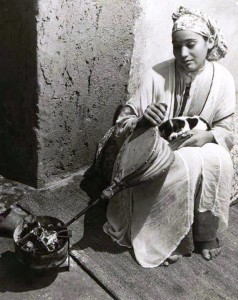 He stood up and kissed the ground in front of him, and told him, «Look at me, for the love of God. I envied and hated you and did my best to make you lose your money and got to the same state I was in when I came here. But God saved you, and here I found you again, a king ruling over people. What I wished for you is what happened to me, and that’s how I came between your hands and you rewarded me with good».
He stood up and kissed the ground in front of him, and told him, «Look at me, for the love of God. I envied and hated you and did my best to make you lose your money and got to the same state I was in when I came here. But God saved you, and here I found you again, a king ruling over people. What I wished for you is what happened to me, and that’s how I came between your hands and you rewarded me with good».
The king told him, «Good intentions always win over bad intentions. Take good intentions and deal with them and you will prosper. Take what I gave you and go back to your land, may God help you».
He took that and went back to his city. He got what he deserved with his bad intentions, and the good man treated him well despite everything, showing him that God rewards or punishes people for everything they do to each other, eventually letting them go back home.
The good man sat in his kingdom, with everyone loving him and looking after him until the defeater of pleasures and the divider of fellowships came upon him. May God’s prayers and peace be upon our prophet Mohamed.
Questo racconto mi è stato narrato dal contastorie l’Hajj Ahmed Ezzarghani durante uno degli incontri privati con gli apprendisti del Cafe Clock. L’ho registrato in questa specifica occasione ma ho, poi, avuto modo di ascoltarlo più volte, sia da l’Hajj che dall’apprendista a cui era stato affidato.
Dopo una formula di apertura, l’Hajj descrive i personaggi principali: la storia narra di due amici, uno buono e magnanimo, l’altro cattivo e invidioso, entrambi mercanti. Il personaggio dalle “buone intenzioni” soleva informare l’amico di ogni commercio che potesse favorirlo, mentre quest’ultimo cercava sempre di ingannarlo, rubava i suoi clienti e danneggiava i suoi affari.
Un giorno il “buono” capisce che il suo commercio sta andando in rovina a causa degli intrighi dell’”amico”. Egli, però, essendo di animo puro, non riesce a ripagarlo con la stessa moneta e decide, piuttosto, di lasciare la città. Inizia allora a viaggiare da un luogo all’altro pensando a cosa fare, fino a quando scopre un piccolo appezzamento di terreno con una sorgente. Vi si ferma, utilizza l’acqua per le abluzioni e inizia a pregare cercando conforto in Dio per le sue disgrazie. Dopo aver meditato, decide di rimanere in quel pezzo di terra e dedicare il suo tempo a pregare e adorare Dio. Si stabilisce lì, senza allontanarsi mai da quel luogo. Hajj dice che all’uomo inizia a crescere una lunga barba, da qui percepiamo il passare del tempo.
Una seconda linea narrativa prende quindi avvio per descrivere la sua nuova vita. Dal quell’appezzamento di terreno passano carovane di mercanti con le loro merci che spesso si fermano a bere dalla fonte e Dio curava chiunque bevesse quell’acqua da qualunque male lo stesse affliggendo e anche chi non era malato, dopo aver bevuto, si sentiva subito meglio. I mercanti iniziano a donare all’uomo vestiti e cibo ed egli contraccambia regalando i frutti di un albero di melograno, cresciuto lì accanto. Così comincia a diventare famoso grazie a quella sorgente miracolosa.
L’Hajj si ferma e con estrema naturalezza inizia a raccontare un’altra storia: un re, il cui regno si trovava non distante da quel luogo, cerca in tutti i modi di curare la figlia malata, afflitta da un male inspiegabile e contro il quale nessuna medicina sembrava avere effetto. Un giorno un ministro comunica al re che ha sentito dire di un uomo che vive accanto ad una fonte di acqua miracolosa. Egli decide, allora, di recarsi subito da quest’uomo per vedere se è in grado di curare sua figlia. Parte con la ragazza e le sue guardie a cavallo fino a raggiungere il terreno della fonte miracolosa. Il buon uomo, vedendo arrivare un re, è intimorito ma quest’ultimo lo invita a non preoccuparsi e gli racconta della malattia della figlia. Il buon uomo, dopo aver specificato che è Dio il vero guaritore, dà dell’acqua alla ragazza. Nel momento stesso in cui la ragazza beve si sente subito meglio, come sollevata, e racconta al padre ciò che sta accadendo. Il re è felice nel vedere sua figlia nuovamente sana e accetta il melograno offertogli dall’uomo, che divide con la ragazza. Anche lui si sente sollevato, più energico, e decide di ripagare il buon uomo con molti doni. Tornati a palazzo, la figlia è vivace come non mai, come il re non la vedeva da tempo. La ragazza allora chiede al padre di aiutare l’uomo della sorgente poiché vive solo e abbandonato. Il padre accetta e manda le guardie a prendere l’uomo che viene lavato, rasato e rivestito con abiti puliti. L’Hajj procede velocemente e racconta del buon uomo che vive a palazzo con il re. La catena degli eventi prende nuovamente avvio quando la ragazza si reca dal padre con un’altra richiesta: poter sposare il buon uomo. Il padre acconsente al volere della figlia e va a parlare con lui. Egli pensa inizialmente che il re lo stia prendendo in giro ma, poi, comprendendo la serietà della sua richiesta, accetta di sposare la figlia del re. Il matrimonio viene celebrato ed è un’occasione di festa per tutto il regno. Il buon uomo, ora diventato genero del re, inizia a sedere a corte con lui e la gente inizia ad apprezzare la sua onestà e bontà d’animo.
La narrazione prosegue a partire dal momento in cui la principessa sta per dare alla luce un bambino e, nello stesso tempo, suo padre si trova in letto di morte. Il re richiama quindi i suoi soldati e dice loro che il genero prenderà il suo posto sul trono dopo la sua morte. Così avviene, e nel frattempo il buon uomo diventa padre ma, soprattutto, re. Regna con giustizia, aiuta le persone in difficoltà e diviene famoso per aver dato avvio ad una festa annuale, dalla durata di tre giorni, durante la quale tutti i poveri del regno possono recarsi a corte per ricevere cibo e vestiti, o qualunque cosa di cui abbiano bisogno.
Un anno, durante questa festa, tra la folla che si avvicina a lui per avere dei doni, il re riconosce un uomo, il suo amico di un tempo che lo aveva mandato in rovina, ora trasandato e vestito di stracci. Arrivato ai suoi piedi, il re gli chiede di raccontare la sua storia ed egli racconta di essere stato un mercante, ma oggi è in rovina poiché ha perso tutto ciò che aveva. Dopo aver viaggiato a lungo, racconta di essere arrivato in questa terra dove la gente lo ha aiutato e lo ha invitato a recarsi alla festa per ricevere dei doni dal re. Il quale, dopo aver ascoltato la storia, chiama le guardie e dice loro di portare via quell’uomo, accompagnarlo all’ḥmām e dargli dei vestiti nuovi. Tornato dal re in modo presentabile, l’uomo lo ringrazia per la sua magnanimità, ma arriva il momento nel quale il re toglie il velo che nascondeva il suo volto e si rivela al vecchio amico. Egli è pietrificato dalla paura e aspetta la vendetta di colui che aveva fatto fallire e che oggi è diventato un re. Ma il re gli chiede semplicemente di raccontare nel dettaglio cosa fosse accaduto. L’uomo narra che parte della sua merce era affondata in mare, mentre il resto era andato perso in un incendio; nessuno voleva aiutarlo nel suo paese poiché era considerato una persona cattiva e per questo aveva iniziato a vagare fino ad arrivare in quel regno. Il re chiama allora le guardie e ordina loro di preparare cammelli, mucche, capre, servitori e anche del denaro per quell’uomo. Costui si domanda come sia possibile che dopo tutto il male da lui arrecatogli, l’amico sia ancora capace di dimostrargli pietà. Il re lo invita a prendere i suoi doni e fare ritorno alla sua terra, affermando, infine, che le buone intenzioni vincono sempre sulle cattive. Il re continua a governare in pace il suo regno circondato dall’affetto della sua famiglia e dei suoi sudditi fino alla morte.
La struttura di questa storia è abbastanza semplice. Infatti, sebbene la narrazione sia ricca di avvenimenti e si snodi lungo un lasso temporale abbastanza ampio, la registrazione dura circa 18 minuti. Nonostante, inizialmente, sembri che i protagonisti della storia siano i due amici, successivamente il buon uomo si rivela il personaggio principale del racconto, mentre l’altro amico, il re e la figlia svolgono un ruolo secondario ma centrale ai fini della narrazione. Nonostante prenda avvio in una città sconosciuta dove i due amici lavorano, il racconto è ambientato in due luoghi principali: il terreno della fonte e il palazzo del re. Anche il tempo non è ben specificato, ma la successione degli eventi suggerisce che la storia copra un arco di tempo di diversi anni.
Morale
Questo racconto è un chiaro esempio di come il bene, in qualche modo, grazie anche all’aiuto divino, riesca sempre a prevalere sul male, e coloro i quali predicano e agiscono in mala fede sono puniti per le loro cattive azioni. Un aspetto aggiuntivo della morale del racconto è rappresentato dalla magnanimità e dal perdono. Essere vittima di soprusi, specialmente se provocati da persone che si considerano amiche, non giustifica la malignità. I buoni verranno premiati in questa vita, o successivamente, e i malvagi prima o poi pagheranno per il male fatto ma, se pentiti, potranno anche loro sperare nel perdono dell’uomo e di Dio.
Dialoghi Mediterranei, n. 41, gennaio 2020
___________________________________________________________________________
Erika Scopelliti ha conseguito la laurea magistrale in Lingue Moderne: Letterature e Traduzione presso l’Università di Messina con una tesi di letteratura araba sulla tradizione dei racconti orali in Marocco. Durante gli studi ha beneficiato di due borse presso l’università Cadi Ayyad di Marrakech (di rispettivamente sei e dieci mesi). Durante questi soggiorni di ricerca è entrata in contatto diretto con i maestri contastorie che ha intervistato e grazie ai quali ha reperito diverso materiale originale. Ha successivamente portato a termine un master in Global Marketing, Comunicazione & Made in Italy del CSCI e della fondazione Italia-USA e il programma della Luiss Business School “Generazione Cultura”. Attualmente vive ad Alicante dove sta svolgendo un tirocinio presso l’EUIPO, occupandosi di proofreading e revisione di traduzioni.
_______________________________________________________________



